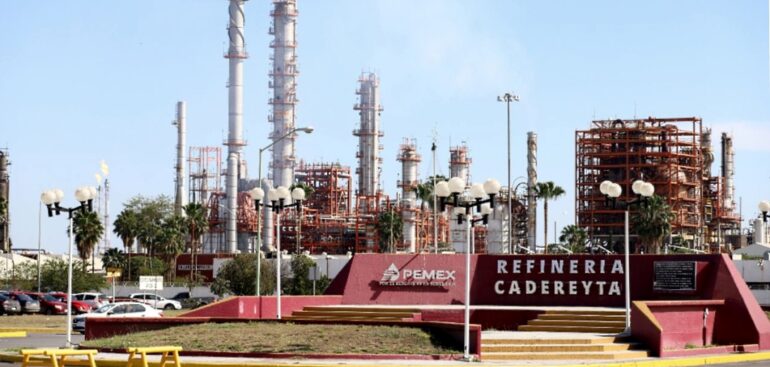Reuters
Mexico’s presidential frontrunner Claudia Sheinbaum plans to invest in state-run Pemex oil refineries to reduce the huge volumes of low-value fuels produced and instead increase production of automotive fuels, one of her advisers said.
Pemex has been producing record levels of heavy fuels, such as particularly polluting fuel oil, while its local refineries struggle to process Maya-type heavy crude.
Last year, Pemex produced 260,285 barrels per day (bpd) of fuel oil, surpassing gasoline production with 252,203 bpd.
Considered a waste product, in Mexico fuel oil is burned primarily to generate electricity.
“Refineries are very expensive and important assets to achieve energy self-sufficiency,” Jorge Islas, Sheinbaum’s energy coordinator, said in an interview on Wednesday.
Islas, a physicist and doctor in Economics, pointed out the possibility of building a new coking unit at the Salamanca refinery to increase gasoline and diesel production. Currently, the refinery is operating at just over half its capacity.
Coking units can process the heavier hydrocarbons coming out of the distillation towers into higher value products, including motor fuels.
Under Andres Manuel Lopez Obrador presidency, Pemex has invested billions of dollars to rehabilitate its six obsolete national refineries. Refining has been a loss-making business for Pemex for years.
To move the country away from costly imports, Pemex also formally inaugurated the new Dos Bocas refinery in July 2022, despite starting it late and going several billion dollars over budget. While the 340,000 bpd refinery is operational, it is not yet producing finished fuels.
Pemex already has two new coke plants in Salamanca and Tula that are expected to come into operation between this year and next.
Lopez Obrador had promised that Mexico would achieve “energy sovereignty” during his six-year term. However, a few months before he leaves office on October 1, this target seems hard to achieve even as refineries have improved their performance.
The six local refineries together have account to 1.6 million bpd capacity process. However, in the first two months of this year, they processed an average of 945,000 bpd, up from the 612,000 bpd they processed in 2018 before Lopez Obrador took office, but still well below his full capacity.
As Dos Bocas refinery set to be fully operational this year and Pemex demands more crude for its other six refineries, the state-run company has asked its trading unit Pemex TRI to reduce crude exports this month by 436,000 bpd.
The government plans to continue reducing its exports, which amounted to 945,000 bpd in the first two months of this year.
Islas reiterated that under Sheinbaum’s plan production would be around 1.8 million bpd of crude oil and condensate even after a few large reserves discoveries have been made.
“Smaller reserves are being discovered each time, at greater depths and with higher costs,” Islas stated.
“What is being considered is energy transition from fossils to renewables,” he stated. “Maintain a fixed hydrocarbon production platform, make better use of energy and meet new demand with renewable energy.”
Asked about the highly-indebted Pemex’s finance, Islas said Sheinbaum government would look for “aid schemes” and “better options.”
“But support cannot be eternal and the company must improve (and) prove that it can be responsible,” he stated.

